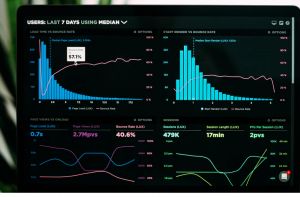Test Owner
IT salaries: The 5 highest-paying jobs in 2023
A recent study predicts increases next year in most digital occupations in France. Among the roles that are expected to benefit, developers, network administrators, product designers and cyber specialists rank high due to higher demand.
On the occasion of the publication of its 2023 Salary Guide, the recruitment firm Robert Half expects salaries to increase compared to the current year for most IT and digital jobs. In this French ranking, five functions stand out in the information systems, digital and commercial categories. Code professionals are always in high demand and will still be in a strong position during salary negotiations. As a result, an entry-level development engineer will earn €40,000 in gross annual compensation in 2023 and up to €60,000 if he or she has advanced expertise. Lead developers are expected to do even better, with salaries ranging from €55,000 (low end) to €80,000 (high end) next year.
Robert Half also forecasts salary increases in systems and network administration and product design (between €40,000 and over €55,000 respectively, depending on the degree of expertise). The same is true for the IT security sector, where the pay slip shows €50,000 for a cyber specialist at the beginning of his or her career and up to €70,000 for an experienced profile. In the sales disciplines, IT sales managers (or sales executives) will also be among the 5 best valued professions with an average salary of between €45,000 gross per year (for a junior profile) and €70,000 (for a senior profile).
IT projects at the heart of priorities
After the economic situation of companies plummeted at the beginning of the health crisis, the recovery seems to be here. Thus, CIOs show a high level of optimism supported by the investment in IT projects and their deployment over the past two years. 73% are more confident about their company's growth prospects for the coming year than they were last year (compared to 60% in 2021).
Increased financial resources and budgets (49%), increased headcount (42%), and expanded business opportunities (40%) explain this paradigm shift. Against this backdrop, 89% of IT departments plan to recruit in the coming months, and nearly a third (31%) anticipate creating new positions. However, they say they are held back by a shortage of technical profiles, leading to increased competition.
Recruitment difficulties set to continue
Indeed, 90% of CIOs expect it to be as difficult or more difficult to recruit in 2023 than in 2022, while 49% believe it will be more difficult. 68% are concerned about their ability to attract the best candidates. The salary criterion cited by 40% of respondents is the number one concern when it comes to attracting talent. Their main concern? Seeing their best talent being poached (36% of respondents). Logically, CIOs' recruitment challenges focus on their ability to identify and secure the most qualified profiles. As evidence of this, 34% cite finding talent with the right skills as the number one issue. Another 31% cite the ability to compete.
One of the highest turnover rates in the market
When asked which categories are the most difficult to find, 36% of IT managers mention cybersecurity, 34% cite network management, while 33% point to cloud and infrastructure. CIOs are also looking for the soft skills needed to drive and advance projects. The preferred qualities are teamwork (31%), as well as motivation and adaptability (26% respectively). For Quentin de Beaufort, Director at Robert Half France, IT specialists will continue to be under pressure in 2023, as the shortage of profiles is still strong, as are the needs of companies. Not to mention the fact that this field is not spared by a phenomenon of high turnover.
"More than a third of CIOs (34%) have seen an increase in turnover over the past year," says the executive. "The importance given to recruitment strategies will be essential to attract and retain talent, he recommends. It will be necessary to play on the salary criterion of course, but also to meet the requirements of candidates in terms of flexibility, but also of corporate culture, which are particularly strong for these profiles," he concludes.
In terms of popularity, Python, Java and C++ still occupy the top three spots in Anywr's ranking of the most used computer languages. But with the arrival of low/no-code technologies, this ranking could change rapidly, driven by the challenges of the developer deficit and the ecological transition
ompanies will place more and more importance on no-code technologies to cope with the shortage of developers and energy challenges. This is the main finding of Anywr (formerly Cooptalis) in its latest barometer of the most in-demand IT languages. To carry out this survey, the platform specialising in the recruitment and placement of candidates analysed a sample of more than 1,000 international job offers in the IT professions between January and September 2022. The results reveal two trends. On the one hand, a concentration of companies' needs and projects around a few languages and uses. On the other hand, recruiters are increasingly interested in automation platforms. In this ranking, it appears that the six languages that came out on top, namely Python, Java, C++, Javascript C and PHP, alone represent 50% of the job offers analysed. As a reminder, according to the State of the Octoverse report published by Github every year, there are 370 computer languages commonly used in the world and to which developers regularly contribute. The concentration phenomenon is therefore particularly marked here.
A timid but noticeable arrival of Rust
However, the study indicates that despite its number one position, Python is regularly singled out as a major resource consumer. As a result, it could give way to certain outsiders, notably Rust, which came in 22nd position and is considered to be high-performance and less memory-hungry. In addition, the trend towards low or no code technologies, which allow applications to be developed without mastering the usual computer languages, is likely to gain ground given the growing shortage of developers. This phenomenon could turn this ranking upside down in the years to come, warns the recruitment platform.
In the meantime, Python remains the big winner in terms of popularity, despite its low speed and high memory consumption. The reasons for its success are its numerous development possibilities in machine learning, AI, big data, data science, video games, robotics and cybersecurity. Ease of use and learning, various frameworks and a very active community also explain its growth. In this trifecta, we find Java in second place. The native language of Android has been in the top three for a very long time. For its part, C++ has made a strong comeback, reaching third place in the ranking, where it has been in the top 10 computer languages since 1986.
Still a strong need for IT development
After the leading group of general-purpose languages, come the technologies associated with more specific uses - SQL and NoSQL for databases, HTML, CSS or JavaScript for hypertext - and those more recent and particularly recommended by certain operating systems for coding native applications, such as Kotlin for Android. For the time being, before these possible changes, the continuing digital transformation of companies and the persistence of needs for website development (back and front end), web and mobile applications, combined with the acceleration of IT projects linked to the exploitation of data, explain the order of appearance of programming languages in this ranking.
Source: www.lemondeinformatique
BMW Group works with AWS.
The BMW Group and AWS (Amazon Web Services) today announced a strategic partnership that will see the two businesses together develop cutting-edge cloud technologies with the goal of fully using the data potential of upcoming car generations. Additionally, the two businesses are working together to create commercial, ready-to-use cloud solutions for safely handling car data. Like in all prior cooperation, the BMW Group maintains complete and sole control over data and complies with local market-specific data protection laws.
Currently, the linked fleet of BMW Group vehicles transmits upwards of ten billion inquiries each day to the "backend," as the IT infrastructure in the cloud is known, which is used to operate and manage the connected vehicle operations. Customer functions like the My BMW App, driver assistance features, charging-optimized route advice, and hazard identification on the road are all based on vehicle data and how it is connected to the cloud. Vehicle data is crucial to the business as well because it is used for certain duties including enhancing customer services, quality management, and after-sales procedures.
The BMW Group established a common access point for internal users of vehicle-generated data in 2017 in order to keep up with the constantly expanding number of linked vehicles. The firm did this by taking steps to ensure that customer data is protected and securely processed in compliance with data privacy standards - across all markets in which the firm operates. The BMW Group will once again own sole ownership of the data in this most recent agreement. Without having access to or knowledge of the data produced by the fleet of connected vehicles owned by the BMW Group, AWS offers cloud infrastructure and services.
Future BMW Group developers will be able to quickly and easily get the required data while working on data-driven improvements to consumer operations thanks to a self-service portal. The BMW Group's engineers and data experts will be able to completely concentrate on the content and quality of the data because the portal will run smoothly and efficiently thanks to the usage of AWS services and dependable infrastructure. Additionally, with the customer's permission, data is also made accessible to third parties for potential applications.
Source: https://www.press.bmwgroup.com/global/article/detail/T0404359EN/bmw-group-collaborates-with-aws-to-bring-new-cloud-technologies-for-fast-and-reliable-availability-of-digital-innovations?language=en
Recruiters are not done with shortages, according to PageGroup's 2023 salary survey. In the tech sector, tensions will continue and some profiles should see their salaries increase by more than 5%.
Tensions will remain in the job market in 2023. Skills shortages and inflationary pressures will not make life easier for recruiters in the IT and digital professions. According to PageGroup's 2023 salary survey, "all IT functions will be under pressure with a shortage of candidates. This problem will particularly affect experts in cybercrime, systems engineering, cloud and data".
DATA ENGINEER, SYSTEM ADMINISTRATOR, DEVELOPER
In IT, the study identifies five key profiles that will be in particular demand in 2023: cybersecurity experts, SAP profiles, experts in agile methodology, DevOps and DevSecOps, and cloud experts.
Those who should see their salaries increase the fastest are project managers (+5%, with a starting salary between 38,000 and 45,000 euros), developers, data engineers (+8%), system and network administrators (+6%), and cybersecurity consultants. A cybersecurity engineer can expect a salary of 45 to 60K between 2 and 5 years of experience.
UI/UX DESIGNER, TRAFFIC MANAGER, CRM MANAGER, DATA ANALYST
In the digital sector, 70% of companies say they are having difficulty recruiting. Experts in data science, digital campaigns, e-store managers, UX designers, chiefs digital officers, and specialists in e-reputation and web marketing (inbound marketing, bid manager, product owner...) will be spoilt for choice when it comes to finding an employer.
According to PageGroup, the professions that will benefit from the most significant salary increases are UI designers, UX designers (40K for a young graduate, up to 80K between 5 and 15 years of experience), traffic managers, CRM managers, and data analysts (38 to 55K after 5 years of career).
ROBOTICS, CYBERSECURITY, IOT
Among engineers and technicians, the consulting and recruitment firm also lists several jobs described as "rare and booming": robotics technician, connected object designer, automation and robotics engineer, embedded electronics engineer, industrial cybersecurity engineer. In these professions, salaries range from 28 to 38K for young graduates, and from 35 to 45K after 5 years of experience.
As for outsourced skills, the most sought-after tech consultants are still developers, ahead of project management consultants, test engineers, business analysts and project managers. The study notes that 83% of IT managers want to outsource security, which promises good prospects for specialized consultants.
Source: www.usine-digitale.fr
Oracle natively delivers MySQL HeatWave on AWS
A month and a half after its OCI cloud and Azure opened a direct link to its database, Oracle is bringing MySQL HeatWave to AWS public cloud customers. This managed OLTP query acceleration and analytics service provides a native user interface on the AWS console.
After Azure, AWS. Oracle continues to integrate its cloud services natively with those of its direct competitors. Competitors who, admittedly, largely outstrip all others in the public cloud market. Simultaneously with the financial results of its first fiscal quarter of 2023, showing an 18% increase in revenue to $11.4 billion (see box), Oracle is delivering its MySQL HeatWave query gas pedal in the Amazon Web Services public cloud. This announcement comes just 8 weeks after the announcement of Oracle Database Service for Microsoft Azure, which gives Azure customers direct access to databases running on OCI, Oracle's cloud infrastructure.
MySQL Autopilot from the AWS Console
Last year, Oracle enhanced the performance of its gas pedal by adding Autopilot, a component that automates the delicate steps of HeatWave's high-performance queries for transactional workloads: allocation of nodes required according to the workload, parallel loading of data, predictive partitioning of columns to be partitioned in memory to best optimize queries, optimal encoding of columns to minimize cluster size, etc. This automation component, which is based on machine learning, is also integrated into the AWS interactive console.
MySQL HeatWave on Azure Coming Soon
MySQL HeatWave on AWS is just the first step in a multi-cloud destiny for the service, which is currently underway between OCI and AWS. The service is expected to be available on Microsoft's Azure in the near future. It is also offered on-premises as part of Oracle's Dedicated Region Cloud@Customer offering for companies that cannot, for regulatory or strategic reasons, move their sensitive databases to the public cloud.
Oracle raises another issue. To implement its MySQL HeatWave query gas pedal, some of its customers have migrated their databases to OCI from AWS. Others are using the service while keeping some of their databases on AWS and running HeatWave on OCI. For the latter, the cost is high given the fees charged by Amazon Web Services to get the data out of its cloud. Not to mention the latency when accessing the database service on OCI. Oracle also said that users of MySQL OLTP applications running on-premises can also replicate data from these databases to MySQL HeatWave on AWS or OCI for near real-time analysis. The vendor also provides access to benchmarks between its service and those of its competitors.
Source: www..lemondeinformatique.fr
IT jobs: the UK relies on its HPI visa
The HPI visa is the UK's new post-Brexit wild card to attract international talent from software development to cybersecurity.
Countries and companies are vying to attract the most in-demand technology profiles in the market. In this context, the UK launched its HPI (High Potential Individual) visa on May 30, the British equivalent of the American H1B visa reserved for highly skilled professionals.
"In engineering and cybersecurity or advanced health research, the UK will be able to welcome talented individuals to drive economic growth as well as technological and medical advances," the UK government said in a statement. "The competition to attract the best international talent is fierce. Receiving profiles from international universities will complement the pool of particularly bright graduates from British universities," the Home Office added.
Who can benefit from an HPI visa?
Profiles from 50 of the world's most prestigious universities and colleges are eligible. Harvard and MIT in the United States, Kyoto University in Japan and PSL University (Paris Sciences et Lettres), the only one classified for France, are among the institutions concerned.
To obtain the visa, security checks are always required, as well as an English language test. The visa costs £715 (about €837) plus significant additional costs (health, maintenance funds, etc.). Successful candidates will receive a 2-year work visa (3 years for those with a PhD) and will be allowed to pursue other avenues to long-term employment, with family if appropriate.
Attracting international talent
Effective January 31, 2020, the United Kingdom's withdrawal from the European Union ("Brexit") has made it difficult to recruit foreign-born, based and trained professionals. The Home Office therefore wanted to simplify and speed up the visa process for "high potential" profiles. There is no cap on the number of visas issued, but they are still "highly selective".
As noted by the Financial Times, the initiative is reminiscent of the Highly Skilled Migrant Program that ran from 2002 to 2008. However, unlike the previous program, the new HPI visa allows its beneficiaries to come to the UK without a referral or a promise of employment from a UK-based company.
There is no longer any question, at least officially, of proving a certain salary level or demonstrating that the position sought cannot be filled by a British worker.
Other countries are seeking to match the supply of available technological skills with the strong demand from companies and public administrations. France is promoting the creation of a one-stop shop for information, "European Tech Talent," which will make Europe more attractive to qualified international profiles.
German Freelance “Freiberufler” Visa
Freelance has become an ever-growing self-employment type, as it gives greater independence and less bureaucracy compared to the conventional type. Working as a freelancer, you are your own boss. There is great flexibility as of the days and hours of working. Moreover, you’re free to choose the clients and projects you want to work for. You have almost no working protocols to follow. You may not need an office to make your work happen.
Potentials needed to freelance:
- High sense of technical individuality.
- Innovative thinking.
- Particular education.
- Personal Qualities
- Responsiveness.
- Sense of self-motivation
- Sense of self-responsibility
How does freelancing work in Germany?
Before even thinking to perform a freelance job in Germany, you must understand the legal environment for self-employment here. This because the profession you’ve chosen to pursue, defines your eligibility for becoming a freelancer here. If the profession you’re thinking to exercise here is acknowledged as a liberal professions ‘Freibe Berufe’, you’ll be able to be a freelancer ‘Freiberufle’. Otherwise, if the job is listed as a commercial profession, you’ll only be able to be a businessperson ‘Gewerbe’.
Which are liberal professions in Germany?
The Income Tax Act of Germany (EStG) has a public listing of liberal and commercial professions here. Yet, the ultimate judgment on whether a profession qualifies as a liberal or as a commercial profession lies in the hands of the local tax office ‘Finanzamt’. Liberal ‘freelance’ professions in Germany, according to EStG §18, are self-employment jobs in the following fields:
- Healthcare
- Law
- Law and business counselling
- Scientific/technical
- Linguistic and information transmitting
Which are the legal requirements for freelancing in Germany?
As a freelancer in Germany, you’ll be excused from the business registration procedure and from getting the trade permit.
Registering with the Tax Office
Instead of the trade office, your freelance activity must be registered with the tax office. The tax office will be the authority to issue the tax number and to collect taxes from you, based on your freelance activity. Registering your business and submitting your tax reports to the Finanzamt can be daunting. As a freelancer, you have other concerns that you need to deal with and an unfamiliar tax system may cause you more to concern. That’s why it is quite a relief to know that you can let tax experts handle all this paperwork for you. Professional tax consultants at Sorted can assist you with preparing all your tax reports, creating invoices and submitting them directly to the tax office.
Why prepare and submit your tax reports as a freelancer with help from certified tax consultants?
- Sorted is a leading Germany-based company with a strong backing of serious investors.
- They cover the entire tax needs for the vast majority of the freelancers and self-employed professionals in Germany.
- Sorted supports you if you have domestic clients or even outside of Germany.
- With Sorted, you register as a freelancer, do your bookkeeping and submit yearly tax reports for free until your revenue meets a certain amount or obtain clients in the EU.
- You can submit your tax reports electronically to the Finanzamt through Sorted. Sorted is connected directly to the Finanzamt through their official software provider, ELSTER.
- For some liberal professions, you must get membership into the respective chambers and for some others the recognition of the foreign qualification beforehand launching your freelance activity.
Can I work as a freelancer if am a foreigner already in Germany?
If you are already residing in Germany, you are entitled to freelance with exceptions. Your situation must be any of the following for working as a freelancer while already in Germany:
- You’re a foreigner working as a researcher or scientists in Germany. You must expect freelancing as a researcher or scientist.
- You’re a foreigner having entered with a German artist visa. You must expect freelancing as an artist.
- You’re a foreigner having entered with a German temporary visa for other purposes. You must meet the criteria to freelance as a foreigner.
- If you’re having difficulties with submitting your tax reports to the Finanzamt, you should seek the assistance of professional tax consultants
Who needs a Germany Freelancer visa?
You’ll need to get a German Freelance Visa beforehand if you’re a visa-regime foreigner, whose intention of coming to Germany to work within a liberal profession.
A freelance visa is typically granted for three months. It can be converted into a residence permit while your visa is valid. The address where you apply for a residence permit is the Local Foreigner’s Authority “Ausländerbehörde or Ausländeramt”.
The residence permit for freelancing can be extended for up to three complete years. To receive such an extension, you must have previously succeeded in your freelance business. This means that you should have evidence of generating sufficient profits to cover living costs for yourself and each of your dependent family members. After 3 years spent with a residence permit for freelancing, you may get a settlement permit. This can happen only if you decide setting up a retail or manual trade business, since then. The residence permit for freelancing can be also converted into a residence permit for self-employment (Residence Act, Section 21/6). This may happen only if you can get the permit to pursue the intended self-employment activity.
Which are the Requirements to Apply for a Freelance Visa?
You must typically submit the application for a freelance visa at the German Embassy or Consulate in the country where you currently live. The procedure is the same as applying for any German visa. You are advised to complete the application 3 months in advance of your planned travel date. Send the application documents as originals with a photocopy of each.
Here are the documents to apply for a German Freelance visa:
- Duly completed national visa application form.
- Valid national passport.
- Two recently made biometric photographs.
- Payment of the visa application fee.
- Travel Insurance.
- Recommendation letters from previous employers.
- Curriculum vitae.
- Cover letter.
- Portfolio of your previous work. Several printed samples of the previous freelance work, or regular work in the same profession.
- Professional authorization. You need to show a license or other authorization to show evidence of your expertise and relevance to pursue the intended profession. This is needed if you’re planning to exercise a profession that requires prior expertise in the field, i.e. Medicine, law, and similar.
- Certificates of earlier education.
- Evidence of a freelance Plan.
- Letters of commitments from future customers/employers. Send at least two of them. These letters must clearly show their intent to employ you when you come here.
- Means of subsistence. Evidence showing you have enough money to cover your living and freelancing costs. This can be one of the following:
- Latest bank statements. From a home-country bank, showing enough available funds.
- Blocked bank account. One of the easiest and the fastest ways to open a German blocked account is through Fintiba/Sutor Bank. The blocked account provided by Fintiba is accepted by German embassies/consulates all around the world.
- Profit/loss statement. It has to show your forecasts about monthly profits and losses from the intended freelance activity.
- Proof of adequate pension plan. Only if you are older than 45.
Germany Freelancer Visa Fees:
The fee to apply for a freelance visa is 60 Euros, for a residence permit is 140 Euros the most, while for a settlement permit is up to 260 Euros
How to start freelancing after arriving in Germany?
After arriving in Germany, you must legalize yourself as a freelancer.
Follow these five key steps before freelancing as a foreigner in Germany:
- Register your living address. You must register in Germany, as soon as you find your permanent accommodation. This procedure is known as ‘Anmeldung’ and is carried through the local Resident’s Registration Office ‘Bürgeramt’. Once this process is completed, you’ll be receiving the confirmation on the living address registration ‘Meldebescheinigung’.
- Open a bank account in a bank in Germany. A good option would be the Kontist account, which offers banking services and invoicing tools for freelancers in Germany. To open an account with Kontist, you need to get the smartphone app or the desktop app.
- Register with Tax Registration Office “Finanzamt”. This is done by submitting the completed Tax Number Registration Form “Fragebogen zur steuerliche Erfassung”. Professional tax consultants such as Sorted can handle all the necessary paperwork on your behalf. Once this process is finished, you will be receiving the Tax ID ‘Steuernummer’. This unique number will be used by you to charge your clients and by the tax office to collect taxes from your freelance operations.
- Get yourself covered by proper health insurance.
- Apply for a Residence permit for freelancing. In the three first months of your arrival, you must make a valid application for a residence permit. The application is done at the Foreigner’s Registration Office ‘Ausländerbehörde’. To apply, you need to provide a completed Application Form for a Residence Permit and required evidence supporting such application. Amongst supporting documents, you need to provide the ‘Meldebescheinigung’, ‘Wohnungsgeberbestätigung’- letter of residence confirmation issued by the landlord of the place you’re living here. This needs to be supplemented by the rental contract.
- Start implementing your freelance plan. You may want to start by contacting the awaiting clients, to inform you about your availability to work.
Swedish Residence Permit Application
IIf you are going to work for longer than three months starting up and running your own business, or if you are becoming a part-owner of a company, you must have a residence permit. The residence permit must already have been granted before you travel to Sweden. You can apply online from your home country or any other country outside Sweden where you live.
Residence permit requirements
To apply for a residence permit to start up your own business, you must:
- have a valid passport (if your passport is about to expire, you should extend it because you cannot get a permit for longer than your passport if valid)
- show that you have considerable experience in the industry and previous experience of running your own business
- show you have relevant knowledge in Swedish and/or English
- prove that you are the person who is running the company, has executive responsibility and owns at least 50 per cent of the company
- your company's services or goods must be produced and/or sold in Sweden
- show that you have enough money of your own to provide for yourself and any family members for the first two years (the equivalent of SEK 200,000 for you, SEK 100,000 for your accompanying wife/husband and SEK 50,000 for each accompanying child)
- present plausible supporting documentation for your budget
- show that you have created customer contacts and/or a network in Sweden
- show that after the trial period of two years, your company’s finances are in balance and that you can support yourself and any family members (the stipulated amounts are calculated on the basis of the Swedish standard for income support plus housing costs).
- in most cases you must pay a fee (application fees for residence permits).
The Swedish Migration Agency will do a financial assessment of your business plans. To be registered as living in Sweden, you must have a permit that is valid for at least one year and you must be planning to live in Sweden for at least one year. Self-employed persons who are going to work for less than three months in Sweden do not need a residence permit. The citizens of some countries must have a visa even for work lasting less than three months.
Requirements for using the e-service
In order to use the e-service, you need:
- copies of the pages in your passport that show your personal data, photo, signature, passport number, issuing country, validity period and if you have permissin to live in countries other than your home country:
- bank certificates showing that you have sufficient funds to support you and your family for the first two years (the equivalent of SEK 200,000 for you, SEK 100,000 for your accompanying spouse and SEK 50,000 for each accompanying child)
- bank certificates showing that you have enough money to buy the company and for the costs and investments you have reckoned on in order to run your business
- a purchase contract if you have purchased or are intending to buy the company or business
- a trading company agreement or share register
- a document showing that you have paid the purchase price, or your share of the purchase price, if you have purchased the company or business
- contracts with customers or suppliers and premises
- the two most recent annual accounts or financial statements (if the company has been in operation)
- a balance sheet and profit and loss statement for the current financial year up to the previous month
- a course certificate or other proof that you know Swedish and/or English qualification certificates from your studies
- employer’s certificates from previous employers
- a registration certificate for companies that you have had or have outside Sweden.
The documents should be translated into Swedish or English by an authorised translator. You must always submit a copy of the original documents.
To find more help: https://www.migrationsverket.se/English/Private-individuals/Working-in-Sweden/Self-employment.html
Our company only takes international applicants as it really takes a lot to relocate someone with a salary work permit. We have given out loans located flats and been betrayed by applicants meanwhile customers see us free sourcing. We get no fee from the customer so our margins are low and customers do not pay timely. So, this is how it works now. Two people have spoiled it all with our company and for applicants. If you want to apply as a salaried person, please do it with competitors. As I have been doing Sweden for 20 years now, I know the costs you will have to endure: that means you will have to live a frugal life with a tiny budget. We have had enough now with some customers and will not work with some in Sweden.
To live in Sweden as salaried person, the salaries now can cover you to live but just ain dwelling. The apartments to rent in Sweden are expensive. It can be say for a room some 4500.00 SEK 45 minutes outside Gothenburg by bus. A Flat in THN is say 8000-9000. 45 Mins by train to Gothenburg. So can be 45-50 Sqm. A studio in Gothenburg central is 9500-13000SEK. All our monthly payments. This can be 18 to 35 sqm in size. If you have family and have kids, it will unfortunately not work. The wives never get work for years too. So we prefer people with no families.
Life looks good in Sweden, but only if you are a freelancer with high rates. Our consultant terms are long term so with good skills set work is endless. We will do a business template for Sweden so your application can be made. We will also create a business plan. You need to show in your bank account you have the necessary funds. If you are successful on relocation, we will pay you quickly and can guide you on all the process.The rates per hour as consultant are around 450.00- 525.00 SEK per hour. We can guide you on taxes and accounting with our partners. Long term is in five years so from that point you will get your full resident permit.
Will 2022 be the year Lidar takes off?
Will the year 2022 be the year of Lidar's take off, with the emergence of applications as varied as they were and unsuspected applications outside of the autonomous car? The year 2021 marks a turning point with the listing of a dozen or so Lidar companies, all American and Chinese. They now have the means to invest in making products more efficient and more accessible.
Lidar (light imaging and detection and ranging) is a sensor that gives machines 3D perception of their environment. By scanning its environment with a laser beam, it detects objects and people in the vicinity and allows to evaluate how far away they are. It is considered a key instrument for driver assistance systems and autonomous cars. "Compared to other detection devices such as cameras, radars and infrared sensors, Lidar offers the advantage of giving a 360-degree perception of the environment over a distance of several hundred meters, with an important notion of volume for the detection of trucks, for example," estimates Raul Bravo co-founder and CEO of Outsight, a French nugget specializing in Lidar data pre-processing software.
Although Lidar may seem like a revolutionary, state-of-the-art creation, it is a long-standing technology. However, it is a 45 year old technology that was originally developed by NASA and the U.S. Army to track lunar and satellite distances. The first commercial Lidar was used in 1995 in a United States Geological Survey project to map vegetation growth on Assateague Island.
Today, automakers see the technology as the next big step in road safety for autonomous cars.
SAP: when the skills gap slows down projects
Today, it is a fact that SAP skills are in short supply. As a matter of fact, quarter of users believes that the long-rumoured shortage is holding back projects.
IT teams don't have enough skills to fully meet the expectations of the business functions of companies that use SAP business systems.
That's the view of ASUG, the U.S. SAP user club. The shortage is such that it "is creating a major disruption in many of our member companies," said Geoff Scott, CEO of the collective, as noted by The Register.
Integration, support, upgrades... 26% of the organizations concerned consider the lack of SAP skills as a major obstacle to the successful deployment of projects.
This is particularly the case when it comes to migrating to the SAP S/4HANA integrated management suite, running on the in-memory HANA base, cloud or on-premise.
S/4HANA in production
31% of the 600 organizations surveyed have already deployed S/4HANA in production, 42% are planning to do so. However, for 49% of the organizations concerned, the lack of skills about the software platform is problematic, including external partners, whether they are system integrators or independent consultants.
Of the companies that report integration difficulties, 28% point to the spread of data errors, 17% to incompatibilities between SAP systems and third-party applications. Another 17% believe they are no longer able to keep up with the pace of technological change.
In France, according to a survey by the French-speaking SAP users' club (USF), this time 56% of the 163 companies and administrations questioned last year judged the German group's strategy for SAP S/4HANA positively. However, a third of the respondents still have reservations about the adaptability of the offering to market developments.
On the other hand, the maintenance extension of S/4HANA, until 2040, and Business Suite 7, including the ERP Central Component (ECC), until 2030, is appreciated. Above all, the level of expertise of SAP consultants on technical solutions receives 80% positive opinions, even if 69% of respondents consider the daily cost of these same consultants "unjustified"...
Source: www.silicon.fr














